Saints of the Day
 |
 |
 |
 |
 |
 |
 |
The Seven Maccabee Brothers - August 1
Biographical selection:
August 1 is the day of the Seven Maccabee Brothers, who were given this name because their martyrdom took place in the time of Judas Maccabeus. Don Guéranger has the following commentary on this sublime episode:
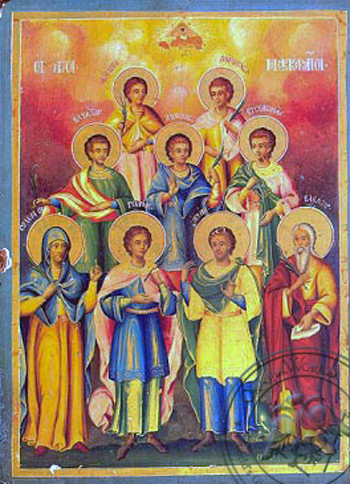 It was the Holy Spirit, as under the Law of Love, who inspired with both words and courage these valiant brothers, and their still more admirable mother, who, seeing her seven sons one after the other suffering the most horrible tortures, uttered nothing but burning exhortations for them to die well.
It was the Holy Spirit, as under the Law of Love, who inspired with both words and courage these valiant brothers, and their still more admirable mother, who, seeing her seven sons one after the other suffering the most horrible tortures, uttered nothing but burning exhortations for them to die well.
At the end, the representative of King Antiochus, the tyrant who was presiding over the martyrdom, pleaded with her: "At least spare the youngest and let him live. Have pity on him." What was her response? She directed these words to her son:
"My son, have pity upon me, who bore you nine months in my womb, and gave you suck three years, and nourished you, and brought you up unto this age. I beseech thee, my son, look upon Heaven and Earth, and all that is in them: and consider that God made them out of nothing and mankind also. So you should not fear this tormentor, but being made a worthy partner with your brothers, receive death, that in that mercy I may receive you again with your brothers."
And the intrepid child ran in his innocence toward the tortures, and the incomparable mother followed her son.
Comments of Dr. Plinio:
Each one of her seven sons was tortured and she, as mother, watched them die one by one. Despite her maternal tenderness, she assisted at each of the seven martyrdoms and exhorted each son to persevere. Aftwerwards, she herself was tortured and died as well. In terms of sublimity there is nothing more than this.
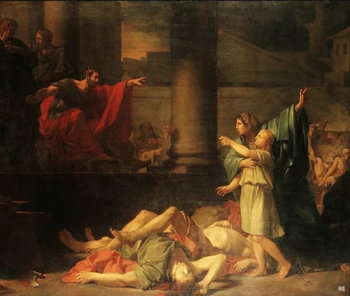 Except for the martyrdom of Our Lord Jesus Christ and the sorrows of Our Lady there is nothing more sublime than this.
Except for the martyrdom of Our Lord Jesus Christ and the sorrows of Our Lady there is nothing more sublime than this.
It is clear that the maternal instinct is entirely turned to the conservation of the sons. The maternal love is made in such way that the son is always seen under the perspective of protection, tenderness and the idea of conserving the son's life is the dominant idea.
This admirable lady did the opposite. She encouraged her sons to die. She was present at their tortures, to the pains of the sons and their laments and to each one she helped him to support the tortures and die well. When the last one's turn came, she encouraged him in the same way, and then she herself went to her martyrdom.
I ask you: Is there anything that can better prove the faith of a person, his elevation of spirit, his love of celestial things, than this gesture? There is nothing!
Secular history has a multitude of examples of gestures of heroism. No gesture is comparable to this one. It is sublimity itself! More than this, there is only that of Our Lady and Our Lord Jesus Christ.
I do not want to say that they are the greatest saints in History after Our Lady, but I want to say that this external gesture perfectly demonstrates sublimity.
The Book of the Maccabeus
Now then, I believe that it would be interesting to go to Scriptures to see how the War of the Maccabees started.
You know what the situation was. The Israelite nation had been infiltrated with the ferment of Paganism, the throne was in the hands of a pagan, the priests had prevaricated, and all the people were offering sacrifices to the idols. It was in this moment that the Maccabees revolted against the pagan masters and were joined by all those in the Hebrew nation who were still faithful.
It was an insurrection that has the characteristics of a Vendée or a Carlist war; it was a pre-Christian feat of arms that has all the sublimity of the Catholic Crusades in the regime of the New Law.
The text of Chapter Two of the First Book of the Maccabeus reads:
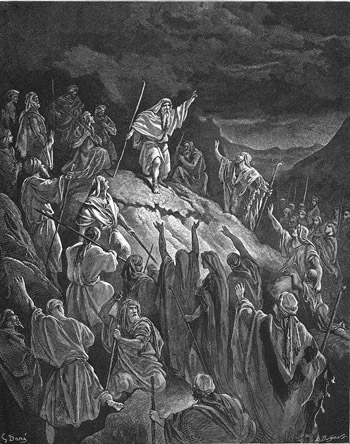 In those days arose Mathathias the son of John, the son of Simeon, a priest of the sons of Joarib, from Jerusalem, and he abode in the mountain of Modin. And he had five sons: John who was surnamed Gaddis: And Simon, who was surnamed Thasi: And Judas, who was called Machabeus: And Eleazar, who was surnamed Abaron: and Jonathan, who was surnamed Apphus. These saw the evils that were done in the people of Juda and in Jerusalem.
In those days arose Mathathias the son of John, the son of Simeon, a priest of the sons of Joarib, from Jerusalem, and he abode in the mountain of Modin. And he had five sons: John who was surnamed Gaddis: And Simon, who was surnamed Thasi: And Judas, who was called Machabeus: And Eleazar, who was surnamed Abaron: and Jonathan, who was surnamed Apphus. These saw the evils that were done in the people of Juda and in Jerusalem.
It is a holy contemplation of the situation from which was born that Holy War. They evaluated all the evils that were being perpetrated, analyzing everything as men turned not toward their trite daily affairs and individual concerns, but rather as men turned more toward the interests of the good cause. Gathering together they weighed the ensemble of that evil.
And Mathathias said: Woe is me, wherefore was I born to see the ruin of my people, and the ruin of the holy city, and to dwell there, when it is given into the hands of the enemies? The holy places are come into the hands of strangers: her temple is become as a man without honor. The vessels of her glory are carried away captive: her old men are murdered in the streets, and her young men are fallen by the sword of the enemies. All her ornaments are taken away.
You see these beautiful words! It is as if he were saying: For me life is worth nothing. Everything that represents comfort, honor, splendor, and my future perspectives is nothing for me. My life is the life of an unhappy man. I am facing a disgrace that shrouds all my joys, that extinguishes all my pleasures.
It is this disgrace: The Holy City, which I love more than my life, was delivered into the hands of the enemies. This is the reason for my unhappiness. There is no joy that can console me; there is no good success that can compensate for this loss. The sadness of having the Most Holy City dominated by the enemies makes my life a continuous cry of mourning. How bitter life is to me in this situation.
Let us reread some parts:
The holy places are come into the hands of strangers: her temple is become as a man without honor.
This is the Ultramontane Cause.
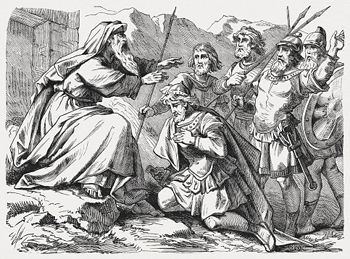 The vessels of her glory are carried away captive:
The vessels of her glory are carried away captive:
Today they are not carried away to foreign lands but to heretical temples.
Her old men are murdered in the streets, and her young men are fallen by the sword of the enemies.
The Book of the Maccabeus continues:
She that was free is made a slave.
The one who was a Queen was made a slave.
And behold our sanctuary, and our beauty, and our glory is laid waste, and the Gentiles have defiled them. To what end then should we live any longer?
That is it. What is life worth under these conditions?
And Mathathias and his sons rent their garments, and they covered themselves with haircloth, and made great lamentation.
This is what we should do: We should make a sorrowful and bitter lamentation. We should say, like Our Lady: "Here in this peace is my most bitter bitterness."
And they that were sent from King Antiochus came thither, to compel them who had fled into the city of Modin, to sacrifice, and to burn incense, and to depart from the law of God.
And many of the people of Israel consented, and came to them: but Mathathias and his sons stood firm. And they that were sent from Antiochus, answering, said to Mathathias: Thou art a ruler, and an honorable and great man in this city, and adorned with sons and brethren. Therefore come thou first, and obey the king's commandment, as all nations have done, and the men of Judah, and they that remain in Jerusalem: and thou, and thy sons, shall be in the number of the king's friends, and be enriched with gold, and silver, and many presents.
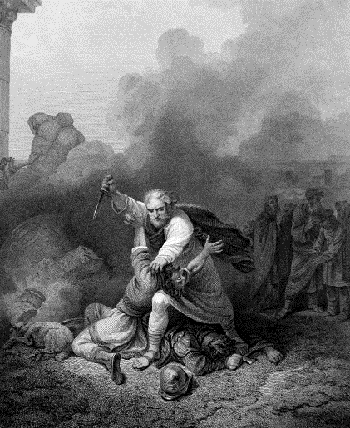 Then Mathathias answered, and said with a loud voice: Although all nations obey King Antiochus, and although every man depart from the service of the law of his fathers, and consent to the King's commands, I and my sons, and my brethren, will obey the law of our fathers.
Then Mathathias answered, and said with a loud voice: Although all nations obey King Antiochus, and although every man depart from the service of the law of his fathers, and consent to the King's commands, I and my sons, and my brethren, will obey the law of our fathers.
God be merciful unto us: It is not profitable for us to forsake the law and the justices of God: We will not hearken to the words of King Antiochus, neither will we sacrifice, and transgress the commandments of our law, to go another way.
Now as he left off speaking these words, there came a certain Jew in the sight of all to sacrifice to the idols upon the altar in the city of Modin, according to the king's command. And Mathathias saw and was grieved, and his reins trembled, and his wrath was kindled according to the judgment of the law ...
Notice that Mathathias was filled with grief, his reins trembled, and his wrath was enkindled. This is the attitude of a man who is truly zealous for the Catholic cause.
And running upon him he slew him upon the altar. Moreover the man whom King Antiochus had sent, who compelled them to sacrifice, he slew at the same time, and then pulled down the altar.
And he showed zeal for the law, as Phinees did by Zamri the son of Salomi. And Mathathias cried out in the city with a loud voice, saying: Every one who has zeal for the law and maintains the testament, let him follow me. So he and his sons fled into the mountains, and left all that they had in the city.
It was thus that the great fight of the Maccabees started.

The Saint of the Day features highlights from the lives of saints based on comments made by the late Prof. Plinio Corrêa de Oliveira. Following the example of St. John Bosco who used to make similar talks for the boys of his College, each evening it was Prof. Plinio’s custom to make a short commentary on the lives of the next day’s saint in a meeting for youth in order to encourage them in the practice of virtue and love for the Catholic Church. TIA thought that its readers could profit from these valuable commentaries.
The texts of both the biographical data and the comments come from personal notes taken by Atila S. Guimarães from 1964 to 1995. Given the fact that the source is a personal notebook, it is possible that at times the biographic notes transcribed here will not rigorously follow the original text read by Prof. Plinio. The commentaries have also been adapted and translated for TIA’s site.
August 1 is the day of the Seven Maccabee Brothers, who were given this name because their martyrdom took place in the time of Judas Maccabeus. Don Guéranger has the following commentary on this sublime episode:

The Seven Maccabee Brothers & their Mother, who encouraged each one in his martyrdom
At the end, the representative of King Antiochus, the tyrant who was presiding over the martyrdom, pleaded with her: "At least spare the youngest and let him live. Have pity on him." What was her response? She directed these words to her son:
"My son, have pity upon me, who bore you nine months in my womb, and gave you suck three years, and nourished you, and brought you up unto this age. I beseech thee, my son, look upon Heaven and Earth, and all that is in them: and consider that God made them out of nothing and mankind also. So you should not fear this tormentor, but being made a worthy partner with your brothers, receive death, that in that mercy I may receive you again with your brothers."
And the intrepid child ran in his innocence toward the tortures, and the incomparable mother followed her son.
Comments of Dr. Plinio:
Each one of her seven sons was tortured and she, as mother, watched them die one by one. Despite her maternal tenderness, she assisted at each of the seven martyrdoms and exhorted each son to persevere. Aftwerwards, she herself was tortured and died as well. In terms of sublimity there is nothing more than this.

‘Do not fear the torments
but be a worthy partner of your brothers’
It is clear that the maternal instinct is entirely turned to the conservation of the sons. The maternal love is made in such way that the son is always seen under the perspective of protection, tenderness and the idea of conserving the son's life is the dominant idea.
This admirable lady did the opposite. She encouraged her sons to die. She was present at their tortures, to the pains of the sons and their laments and to each one she helped him to support the tortures and die well. When the last one's turn came, she encouraged him in the same way, and then she herself went to her martyrdom.
I ask you: Is there anything that can better prove the faith of a person, his elevation of spirit, his love of celestial things, than this gesture? There is nothing!
Secular history has a multitude of examples of gestures of heroism. No gesture is comparable to this one. It is sublimity itself! More than this, there is only that of Our Lady and Our Lord Jesus Christ.
I do not want to say that they are the greatest saints in History after Our Lady, but I want to say that this external gesture perfectly demonstrates sublimity.
The Book of the Maccabeus
Now then, I believe that it would be interesting to go to Scriptures to see how the War of the Maccabees started.
You know what the situation was. The Israelite nation had been infiltrated with the ferment of Paganism, the throne was in the hands of a pagan, the priests had prevaricated, and all the people were offering sacrifices to the idols. It was in this moment that the Maccabees revolted against the pagan masters and were joined by all those in the Hebrew nation who were still faithful.
It was an insurrection that has the characteristics of a Vendée or a Carlist war; it was a pre-Christian feat of arms that has all the sublimity of the Catholic Crusades in the regime of the New Law.
The text of Chapter Two of the First Book of the Maccabeus reads:

Mathathias exhorts his people to a Holy War
It is a holy contemplation of the situation from which was born that Holy War. They evaluated all the evils that were being perpetrated, analyzing everything as men turned not toward their trite daily affairs and individual concerns, but rather as men turned more toward the interests of the good cause. Gathering together they weighed the ensemble of that evil.
And Mathathias said: Woe is me, wherefore was I born to see the ruin of my people, and the ruin of the holy city, and to dwell there, when it is given into the hands of the enemies? The holy places are come into the hands of strangers: her temple is become as a man without honor. The vessels of her glory are carried away captive: her old men are murdered in the streets, and her young men are fallen by the sword of the enemies. All her ornaments are taken away.
You see these beautiful words! It is as if he were saying: For me life is worth nothing. Everything that represents comfort, honor, splendor, and my future perspectives is nothing for me. My life is the life of an unhappy man. I am facing a disgrace that shrouds all my joys, that extinguishes all my pleasures.
It is this disgrace: The Holy City, which I love more than my life, was delivered into the hands of the enemies. This is the reason for my unhappiness. There is no joy that can console me; there is no good success that can compensate for this loss. The sadness of having the Most Holy City dominated by the enemies makes my life a continuous cry of mourning. How bitter life is to me in this situation.
Let us reread some parts:
The holy places are come into the hands of strangers: her temple is become as a man without honor.
This is the Ultramontane Cause.

The Maccabee brothers receive their father's blessing
Today they are not carried away to foreign lands but to heretical temples.
Her old men are murdered in the streets, and her young men are fallen by the sword of the enemies.
The Book of the Maccabeus continues:
She that was free is made a slave.
The one who was a Queen was made a slave.
And behold our sanctuary, and our beauty, and our glory is laid waste, and the Gentiles have defiled them. To what end then should we live any longer?
That is it. What is life worth under these conditions?
And Mathathias and his sons rent their garments, and they covered themselves with haircloth, and made great lamentation.
This is what we should do: We should make a sorrowful and bitter lamentation. We should say, like Our Lady: "Here in this peace is my most bitter bitterness."
And they that were sent from King Antiochus came thither, to compel them who had fled into the city of Modin, to sacrifice, and to burn incense, and to depart from the law of God.
And many of the people of Israel consented, and came to them: but Mathathias and his sons stood firm. And they that were sent from Antiochus, answering, said to Mathathias: Thou art a ruler, and an honorable and great man in this city, and adorned with sons and brethren. Therefore come thou first, and obey the king's commandment, as all nations have done, and the men of Judah, and they that remain in Jerusalem: and thou, and thy sons, shall be in the number of the king's friends, and be enriched with gold, and silver, and many presents.

Mathathias slays the Jew
who went to offer incense to the idol
God be merciful unto us: It is not profitable for us to forsake the law and the justices of God: We will not hearken to the words of King Antiochus, neither will we sacrifice, and transgress the commandments of our law, to go another way.
Now as he left off speaking these words, there came a certain Jew in the sight of all to sacrifice to the idols upon the altar in the city of Modin, according to the king's command. And Mathathias saw and was grieved, and his reins trembled, and his wrath was kindled according to the judgment of the law ...
Notice that Mathathias was filled with grief, his reins trembled, and his wrath was enkindled. This is the attitude of a man who is truly zealous for the Catholic cause.
And running upon him he slew him upon the altar. Moreover the man whom King Antiochus had sent, who compelled them to sacrifice, he slew at the same time, and then pulled down the altar.
And he showed zeal for the law, as Phinees did by Zamri the son of Salomi. And Mathathias cried out in the city with a loud voice, saying: Every one who has zeal for the law and maintains the testament, let him follow me. So he and his sons fled into the mountains, and left all that they had in the city.
It was thus that the great fight of the Maccabees started.
 | |
|
|
The texts of both the biographical data and the comments come from personal notes taken by Atila S. Guimarães from 1964 to 1995. Given the fact that the source is a personal notebook, it is possible that at times the biographic notes transcribed here will not rigorously follow the original text read by Prof. Plinio. The commentaries have also been adapted and translated for TIA’s site.